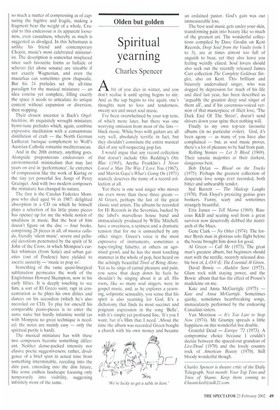Spiritual yearning
Charles Spencer
bit of you dies in winter, and you don't realise it until spring begins to stir. And as the sap begins to rise again, one's thoughts turn to love and tenderness, sweaty sex and sweet soul music.
I've been overwhelmed by your top tens, of which more later, but there was one worrying omission from most of the lists — black music. White boys with guitars are all very well, absolutely terrific in fact, but they shouldn't constitute the entire musical diet of any self-respecting pop fan.
I would argue that any record collection that doesn't include Otis Redding's Otis Blue (1965), Aretha Franklin's I Never Loved a Man The Way I Love You (1967), and Marvin Gaye's What's Going On (1971) scarcely deserves the name of a record collection at all.
Yet there is one soul singer who moves me even more than these three greats — Al Green, perhaps the last of the great classic soul artists. The albums he recorded for Hi Records in the Seventies, backed by the label's marvellous house band and immaculately produced by Willie Mitchell, have a sweetness, a sexiness and a dramatic tension that for me is unmatched by any other singer. Green's voice is the most expressive of instruments, sometimes a nape-tingling falsetto, at others an agonised growl, and he has the most touching stammer in the whole of pop, best heard on the achingly beautiful Tired of Being Alone. Yet as he sings of carnal pleasure and pain, you sense that deep down he feels he shouldn't be singing about it at all. His roots, like so many soul singers, were in gospel music, and, as he explores a yearning, solipsistic sensuality, you sense that his spirit is also yearning for God. It's a dichotomy that finds its most succinct and poignant expression in the song 'Belle', with it's simple yet profound line, 'It's you I want, but it's Him that I need.' About the time the album was recorded Green bought a church with his own money and became
an ordained pastor. God's gain was our immeasurable loss.
The best soul music gets under your skin, transforming pain into beauty like so much of the greatest art. The wonderful collections compiled by Dave Grodin on Kent Records, Deep Soul from the Vaults (yds 1 to 3), are at times almost too full of anguish to bear, yet they also leave you feeling weirdly elated. Soul lovers should also seek out the recently released James Carr collection The Complete Goldwax Singles, also on Kent. This brilliant and bizarrely undervalued singer, who was dogged by depression for much of his life and died last year, has been described as 'arguably the greatest deep soul singer of them all', and if his cavernous-voiced version of that masterpiece of illicit love, 'The Dark End Of The Street', doesn't send shivers down your spine then nothing will.
Finally to my own top-ten favourite albums (in no particular order). God, it's been agony — as many of you have also complained — but, as soul music proves. there's a lot of pleasure to be had from pain.
Rolling Stones — Let It Bleed (1969). Their satanic majesties at their darkest, dangerous best.
Bob Dylan — Blood on the Tracks (1975). Perhaps the greatest collection of desperate love songs ever recorded, both bitter and unbearably tender.
Syd Barrett — The Madcap Laughs (1970). Pink Floyd's presiding genius goes bonkers. Funny, scary and sometimes strangely beautiful, Etta James — Tell Mama (1969). Raucous R&B and searing soul from a great survivor now deservedly dubbed the matriarch of the blues.
Gene Clark — No Other (1974). The former Byrds man in glorious solo flight before the booze brought him down for good.
Al Green — Call Me (1973). The great man's greatest album, but beginners should start with the terrific, recently released double best of, L-O-V-E: The Essential Al Green.
David Bowie — Aladdin Sane (1973). Glam rock with staying power, and the Bowie album that has the effect of Proust's madeleine on me.
Kate and Anna McGarrigle (1975) — Kate and Anna McGarrigle. Sometimes quirky, sometimes heartbreaking songs, immaculately performed by the endearing Canadian sisters.
Van Morrison — It's Too Late to Stop Now (1974). Mr Grumpy spreads a little happiness on this wonderful live double.
Grateful Dead — Europe '72 (1973). A compromise choice because I couldn't decide between the spaced-out grandeur of Live/Dead (1970) and the lovely country rock of American Beauty (1970). Still bloody wonderful though.
Charles Spencer is theatre critic of the Daily Telegraph. Next month: Your Top Tens and Trios of Shame. Keep them coming to Chasnicked@talk21.com






































































 Previous page
Previous page